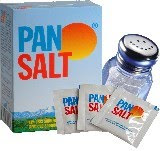Obesity and diabetes are two tightly interlinked conditions that almost always cannot exist without each other. Weight and fat gain, a high-salt and –sugar diet, and a sluggish lifestyle could all conspire to raise the levels of blood glucose and blood fat. Such conditions in turn raise health risks that, if untreated, could lead to more serious physical problems, among them type-2 diabetes.
Health-indicator statistics of the Department of Health rank diabetes as the ninth-leading cause of death in the Philippines
While the link between obesity and diabetes has long been established, recent findings have traced the relationship between salt intake and obesity. In a recently published report in the journal Progress in Cardiovascular Diseases, scientists from Finland claimed that the increased intake of salt has apparently played an important role in the increased consumption of soft drinks, and therefore in the increase of energy intake.
Dr. Heikki Karppanen of the University of Helsinki University of Kuopio
The groundbreaking research also noted the worldwide trend in the increase of age-adjusted blood pressure since the late 1980s. This increase, wrote the authors, “appears to coincide with the turn of the sales of food-grade salt from a decreasing trend to a rapid increase in the later 1980s and in the 1990s.” The study adds that increasing intakes of sodium found in common salt necessarily produce a progressive increase in thirst; and between 1997 and 2001, the energy intake from soft drinks also increased by 135 percent, adding about 278 kcal to the average person’s daily energy intake.
Common salt contains only sodium chloride, which is known to be the most significant cause of high blood pressure. Even a small rise in blood pressure increases the risk for coronary and other serious cardiovascular diseases, such as heart attacks, strokes or heart failure. It is a medical fact that the human body needs only very small amounts of both sodium and chloride.
The Finnish research drives home the relationship between salt and calorie intake that could lead to obesity and other health problems. But while people cannot live without these flavors, their consumption could be moderated to healthier levels. There are also healthier options now widely available, so while it’s not yet too late to switch to more health-conscious ways, it would be wise to explore healthy forms of sugar and salt.
Where to start after one has identified that sodium is the hidden enemy in common salt? So-called salt-free seasoning blends are a mixture of flavorful dried herbs and spices that don’t contain sodium chloride. Salt substitutes, on the other hand, replace some or all of the sodium in salt with other minerals such as potassium or magnesium. Potassium chloride is a common salt substitute. But salt substitutes, or some low-sodium salts, often taste bitter and aren’t recommended for people on a potassium-restricted diet.
Fortunately in the Philippines Finland
PANSALTâ is virtually devoid of the harmful effects characteristic of common salt and has the best taste profile among all the healthy salt options and alternatives in the market today. So if you watch your diet to avoid or manage hypertension, diabetes or obesity, or if you simply wish to maintain a healthy lifestyle, PANSALTâ is the tastier, healthier choice.
Imported by Accord International, Inc., PANSALTâ is now available in major supermarkets nationwide & in select Mercury Drugstores.
For more information, visit www.pansalt.ph or call (632) 531-4881.

No comments:
Post a Comment